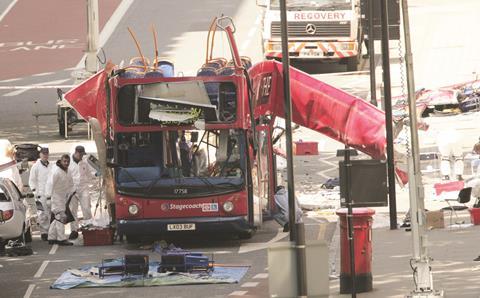Within our laws, terrorism attracts its own legal exceptionalism – its deeds and the state’s responses are in a legal class apart. But as our laws develop, do they reflect both the correct threats and our democratic values? Katharine Freeland reports
The low down
Much of the anti-terrorism legislation of the past 15 years remains controversial. And no wonder – the official published threat level for the UK has not dipped below ‘substantial’ since August 2006. Allegations that police misuse powers granted in the name of combating terror threats have been a constant theme, not least where arrests are made in the context of policing protests. But the National Security Act 2023 signals a shift in concerns – the terror threats posed by foreign governments. It can be used to protect, for example, foreign dissidents and journalists now based in the UK. Government is also facing up to the impact of AI on radicalisation and misinformation. The security of critical physical and digital infrastructure is a leading concern.
In May, three alleged Iranian spies were charged with targeting UK-based journalists working for Iran International, a London-based Persian-language satellite channel (they pleaded not guilty). Although cases of espionage and assisting foreign intelligence agencies are not uncommon – six Bulgarians were jailed for spying for Russia in May – the Iran arrests used new powers under the National Security Act 2023, as Iran was named for the first time as the controlling state behind the planned attack.
The NSA is targeted at combating state threats and replaces the Official Secrets Acts of 1911, 1920 and 1938.
The act introduces new offences to address state threat activity, including undeclared agents, disinformation campaigns and political interference. It also enhances powers of arrest, detention and search and seizure. Under its auspices the Foreign Influence Registration Scheme (FIRS), requiring the registration of arrangements for political activities in the UK directed by a foreign power, will come into effect in July.
Francesca Whitelaw KC from 5 Essex Chambers explains: ‘FIRS is a mechanism for transparency that aims to distinguish between parties who are legitimately involved in political activities, and those who might be directed or puppeted by hostile foreign states. Not being registered can then serve as a prompt to a wider investigation.’
A public and police law barrister, Whitelaw has appeared in multiple terrorism inquests, including those arising from the attacks at Streatham, Fishmongers’ Hall, London Bridge and Borough Market and Westminster Bridge. She is currently counsel to the inquiry for the public inquiry into the death of Dawn Sturgess in Salisbury.
The government has already announced its intention to list Iran, which will join Russia in the enhanced tier of FIRS. Since 2022, MI5 and the police have responded to 20 Iran-backed plots to kidnap or kill targets based in the UK, according to the head of MI5, speaking in November.

The NSA is different
The NSA is the latest in a series of laws designed to counter terrorism, although it marks a distinct sea change in its focus on state threats. It has had a different reception from human rights groups to other terror legislation.
In January, an Amnesty International briefing noted: ‘The past 15 years have seen the adoption of wave upon wave of new counter-terror legislation, together with the increasing securitisation of life in the UK. This securitisation continues to negatively affect a wide range of human rights.’
But the paper is silent on the NSA. Similarly, while Liberty briefed and lobbied extensively on terrorism and border security legislation introduced in 2018, it did not express opposition to the 2023 act.
The attack in Salisbury in 2018, in which Russian operatives allegedly poisoned British and Russian nationals with a military-grade nerve agent, highlighted the growing risk of attacks from hostile states on British soil.
This attack, and the murder of former Russian intelligence officer Alexander Litvinenko, together with more generalised fears over expanding Russian and Chinese influence, were major drivers behind the new act.
Terrorism defined: 2000
The first UK-wide law to tackle terrorism was the Terrorism Act 2000, which defined terrorism and the powers and procedures to address it for the first time. Subsequent acts – in particular, the Terrorism Act 2006 and the Counter-Terrorism Act 2008 – introduced provisions to amend or broaden the definition of terrorism offences, increase penalties and provide enhanced powers for counter-terrorism policing.
Those enhanced powers remain controversial. Amnesty argues that the threshold for triggering and extending emergency measures in the UK has been lowered, with the published threat level being ‘substantial’ since August 2006 meaning ‘any and all counter-terror measures are not only necessary, but necessary on a permanent basis’.
But the NSA’s focus on threats from foreign state actions has landed differently.
‘The law is a living instrument and it does not lie still,’ says Lord Carlile KC, who served as the independent reviewer of terrorism legislation between 2001 and 2011. ‘It is an adaptive framework that must respond to emerging risks, such as the spread of extremist material online, in a measured rather than kneejerk way.’
Lawmakers must not only craft legislation which shuts down terrorists but which balances the central tension between ensuring national security and protecting civil liberties.
‘Early criticisms of the Terrorism Act 2000 focused on the breadth of the definition of terrorism, with many expressing concerns that it would impact free speech and personal freedoms,’ says Whitelaw, who represented the police in the first-ever facial recognition Court of Appeal challenge.
Contrast this with the mood after the Southport attack, which generated concern that the definition of terrorism contained in existing legislation was not wide enough – in this case, to capture a mass casualty attack that was not obviously motivated by ideology.
The controversy over whether widespread facial recognition is a legitimate terror-fighting tool or an affront to civil liberties is an echo of the unease created by control orders, brought in by the Prevention of Terrorism Act 2005 to track suspected terrorists.

Permitting unconvicted people to be subject to measures such as curfews and restrictions on communication and travel caused concern. These measures were replaced by civil preventative orders under the Terrorism Prevention Investigation Measures Act (TPIM) 2011, which are time-limited. It remains controversial.
‘Sacrifices to individual rights, such as free speech, are justified when necessary for public security if balanced proportionately,’ is Carlile’s assessment.
The government continues to experiment with variations on this type of enforcement. The Crime and Policing Bill, currently at report stage, proposes the use of ‘youth diversion orders,’ to address youth radicalisation and prevent individuals from being drawn into terrorism.
Each terrorist atrocity that occurs – the 7/7 London attacks in 2005, the Westminster Bridge and Manchester Arena in 2017, and London Bridge/Fishmongers’ Hall in 2019 – spurs new law that aims to close apparent gaps.
Emergency legislation is also a tool, swiftly deployed after Fishmongers’ Hall in the Terrorist Offenders (Restriction of Early Release) Act 2020. In April, Martyn’s Law – or the Terrorism (Protection of Premises) Act 2025 – received royal assent.
Named after Martyn Hett, who was killed in the Manchester Arena attack, it requires event organisers to implement new security protocols and ensure that staff are trained to respond to incidents.
Landmark legislation
The Terrorism Act 2000 legally defined ‘terrorism’ for the first time. The act states that terrorism is the use or threat of violence against a person, serious damage to property, endangering a person’s life, or creating a serious risk to the public for the purpose of advancing a political, religious, racial or ideological cause.
Under the act, the government can proscribe organisations that are involved in terrorism, such as Hamas. After Jonathan Hall KC’s recent review of the national security legislation, a new power will be created under the National Security Act to allow the proscription of state and state-backed bodies.
The Terrorism Act also grants the police crucial powers, including the power to arrest and detain individuals suspected of terrorism, as well as extended pre-charge detention. Individuals can be arrested without a warrant, and stopped and searched, if the police reasonably suspect involvement in terrorist activities.
Terrorist offences defined in the act include membership of a proscribed organisation, funding terrorism and possessing materials for terrorist purposes. Other powers provided for in the act include the power to freeze and seize assets connected to terrorism, and for the police to stop, question and search individuals and goods entering or leaving the UK to identify potential terrorist threats.
The Terrorism Act 2000 has been amended or supplemented by further statutes, including the Anti-Terrorism, Crime and Security Act 2001; the Criminal Justice Act 2003; the Prevention of Terrorism Act 2005; the Terrorism Act 2006; the Counter-Terrorism Act 2008; the Counter-Terrorism and Security Act 2015; and not least the National Security Act 2023 – a comprehensive piece of legislation aimed at tackling the growing threat posed by bad actor states and their affiliates.
Forthcoming legislation: in July the Foreign Interest Investor Regime (via schedule 4 to the National Security Act 2023) will come into force.
Threat from multiple fronts
In 2025 the UK faces severe challenges from many quarters. While earlier legislation had focused on countering the threat posed by organised terrorist groups such as Al-Qaeda, recent events have highlighted the risk of lone attacks from young men radicalised online in their bedrooms. They may not subscribe to a single murderous ideology, but present a serious danger nonetheless.
The Counter-Terrorism and Security Act 2015 placed a duty on authorities in health, education, local government and criminal justice to stop people being drawn into terrorism, placing the Prevent programme, introduced in 2003 and strengthened after the 7/7 attacks in 2005, on a statutory footing.
Yet Axel Rudakubana, who killed three girls and injured 10 others in Southport in 2024, was reportedly not eligible for the scheme as he had no ‘clear ideology.’ In the wake of the attack Jonathan Hall KC, the current independent reviewer of terrorism legislation, recommended new offences for mass casualty attacks lacking ideological motive.

Robust black letter law is essential, but so is scrutiny of how it is operating in practice. Hall was also recently commissioned by home secretary Yvette Cooper to examine the operation of national security legislation. The context was the question of how to curb the Islamic Revolutionary Guard Corps (IRGC), which is sanctioned by the UK but proscribed by the US, Canada, Sweden and others.
‘State threats have to be dealt with very differently from terrorist groups,’ Hall tells the Gazette. ‘You aim to eliminate a terrorist group, but you cannot eliminate a state. The political pressure to proscribe the IRGC, a highly aggressive foreign intelligence service, has been very high, but at present practical actions for politicians are limited.’
'"Smaller" powers, while not headline-grabbing, are practically significant for police operations during high-threat situations involving state actors'
Jonathan Hall KC
Hall examined the current powers of proscription under the Terrorism Act to see if they could be applied to states or state-backed organisations. Reporting back in May, Hall identified legal difficulties with this proposition, and recommended the creation of a new power of proscription specifically for state threats.
Hall also highlighted practical measures to aid counter-terrorism police in fighting state threats, including enhanced stop-and-search powers, the ability to cordon off areas during investigations and stronger measures for post-charge questioning.
‘These “smaller” powers, while not headline-grabbing, are practically significant for police operations during high-threat situations involving state actors,’ he says.
The statistics are concerning. MI5 notes that threat investigations are up by nearly 50% in the past year, and police investigations into state threats led by counter-terrorism police are up fivefold since 2018. The conviction of six Bulgarians spying for the Kremlin shows how the lines drawn between state threats, terrorists and organised criminals are merging. State threat operations are now hybrid and wide-ranging, including spreading disinformation, targeting journalists, breaching cybersecurity and undermining border security.

Hall has also been conducting research into foreign interference with AI and large language models, the results of which will be released shortly.
‘AI can be used as a terrorist recruitment tool, or a tool of self-recruitment, with anyone able to go on to the internet and create a chatbot of Osama Bin Laden that then glorifies terrorism,’ he says. ‘In instances such as these, it is difficult to prise behind the layers to find out how criminal liability under terrorism legislation might work.’
Parliament must respond to these enhanced threats, considering counter-terrorism measures not just in headline terrorism laws but across other areas. The Border Security, Asylum and Immigration Bill aims to strengthen counter-terrorism powers to pursue organised immigration crime and strengthen border investigations.
Protecting critical national infrastructure is also a focus. The Cyber Security and Resilience Bill, which will be laid before parliament later this year, aims to tackle a threat landscape described by the National Cyber Security Centre’s 2024 Annual Review as ‘diffuse and dangerous.’
‘Although the Cyber Security and Resilience Bill isn’t explicitly framed as counter-terrorism legislation,’ says Whitelaw, ‘it indirectly supports it by strengthening our ability to prevent and respond to cyber threats which might be linked to terrorism.’
’When something happens extra-territorially on the internet that has an impact in our country, the government can take actions to stop that service provider providing services’
Lord Carlile
The government has made explicit its work with international allies to create comparable standards of protection, aligning UK cybersecurity standards with the EU’s Network and Information Systems Directive, and FIRS with the US Foreign Agents Registration Act.
Regulating the internet and forcing online service providers to take responsibility for dangerous content involves complex challenges. The chaos caused by false information disseminated worldwide after the Southport attack demonstrated the importance of tackling it nonetheless.
Carlile says: ‘When something happens extra-territorially on the internet that has an impact in our country, the government can take actions to stop that service provider providing services of any kind in the UK, or by fining them a substantial part of their turnover.’
He adds: ‘These are the kinds of measures you take when something new and threatening is on the horizon. And in my view, the government should be doing that in relation to terrorist incitement and similar actions on the internet.’
The debate over national security versus personal freedoms is a perennial one – in which, as Carlile points out, it is important to distinguish between the ‘pendulum of perception and the pendulum of reality’.
Arguably, because many of the facts behind lawmaking in this area remain by necessity obscure, tackling terrorism requires high trust from the public in the robustness of parliament and the legal system.
Judicial review and independent oversight bodies such as the independent review of terrorism/national security legislation are essential tools to scrutinise how the black letter law is operating in practice and where the gaps are to fill.
‘If we do not have the availability of a range of measures to enable us to prevent terrorism then something awful is going to happen,’ says Carlile. ‘But by and large, I believe that we can hold our heads up high in the world on the quality of our terrorism law and the way it is policed.’
Katharine Freeland is a freelance journalist































No comments yet